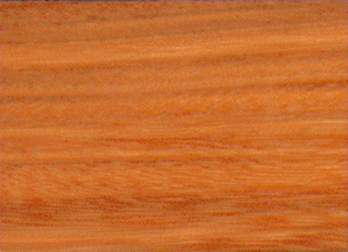
Achi (Brachystegia eurycoma)
Family: Leguminosae
Common names: Achi, Ako, Akolodo, Akpakpa, Akume, Anyan, Brachystegia, Ekop-naga, Eku, Etare, Kepuruk, Meblo, Memblo, Naga, Okwen, Otigbo, Ukung
Distributed in: Cameroon, Nigeria (Africa)
Common uses: Carvings, Furniture, Heavy construction, Light construction, Plywood, Turnery, Veneer
Product sources: The ITTO reports that timber from this species is produced in negligible quantities and exported only occasionally.The timber is occasionally available for purchase from U.S. importers. Its uses are rather limited, and supplies are adequate, since it is being exported in greater quantities.
Environment profile: Rare
Tree size: Trunk diameter is 150-200 cm
Colors: the heart isWhite, Yellowand the sapwoodWhite, Yellow.The grain isStriped figure, the textureMediumand the lusterMedium
Natural durability: Resistant to powder post beetles, Susceptible to insect attack
Silica Content: Siliceous
Kiln Schedules: Dry at a slow speed
Kiln Drying Rate: Naturally dries quickly
Drying Defects: Moderate end spitting, Moderate surface checking
Ease of Drying: Reconditioning Treatement
Tree Identification: Bole/stem form is not buttressed
Comments: General finishing qualities are rated as good
Blunting Effect: Moderate
Boring: Fairly easy to very easy
Carving: Fairly Difficult to Very Difficult
Cutting Resistance: Moderate to saw
Mortising: Very Good to Excellent
Moulding: The moulding finish is usually poor
Movement in Service: The moulding finish is usually poor
Nailing: Fairly Difficult to Very Difficult
Planing: Planes to a poor finish
Response to hand tools: Fairly Difficult to Difficult to Work
Routing recessing: Fairly Easy to Very Easy
Sanding: Very Good to Excellent Results
Veneering qualities: Veneers easily, Veneers moderately easy
Steam bending: Fairly Easy to Very Easy
Screwing: Fairly Easy to Very Easy, Very Good to Excellent Results; Turning: Very Good to Excellent Results
Polishing: Very Good to Excellent; Staining: Very Good to Excellent;
- Numerical data Metric
- Numerical data English
- Strength properties
- References
 |
 |
 |
 |
| Item |
Green |
Dry |
Metric |
| Specific Gravity |
|
|
|
| Density |
|
721 |
kg/m3 |
| Bending Strength |
|
|
kg/cm2 |
| Crushing Strength |
|
|
kg/cm2 |
| Hardness |
|
|
kg |
| Impact Strength |
|
|
cm |
| Shearing Strength |
|
|
kg/cm2 |
| Stiffness |
|
|
1000 kg/cm2 |
| Tangential Shrinkage |
|
|
% |
| Radial Shrinkage |
|
|
% |
| Weight |
|
|
kg/m3 |
| Maximum Load |
|
|
cm-kg/cm3 |
| Toughness |
|
|
cm-kg |
| Static Bending |
|
|
kg/cm2 |
|
 |  |  |  | | Item | Green | Dry | English | | Density | | 45 | lbs/ft3 | | Weight | 44 | 35 | lbs/ft3 | |
Density (dry weight) = 38-45 lbs/cu. ft.
Dnesity (dry wieght) = 53-60 lbs/cu. ft.
Density (dry weight) = 46-52 lbs/cu. ft.
Bolza, E., Keating, W.G.,1972,African Timbers - the Properties, Uses and Characteristics of 700 Species,C.S.I.R.O. Div. of Building ResearchBrown, W.H.,1978,Timbers of the World No.1 Africa,TRADA, Red Booklet SeriesErfurth, T., Rusche, H.,1976,The Marketing of Tropical Wood A. Wood Species from African Moist Forests,F.A.O. Forestry DepartmentJay, B.A.,1968,Timbers of West Africa,TRADA, Red Booklet SeriesKeay, R.W.J.,1964,Nigerian Trees Vol.2,Nigeria Federal Department of Forest Research, IbadanKennedy, J.D.,1936,Forest Flora of Southern Nigeria,Government Printer LagosTimber Development Association,1948,Some New Timbers and Their Uses No. 34,Timber Development Association Limited, London [TRADA]
|








